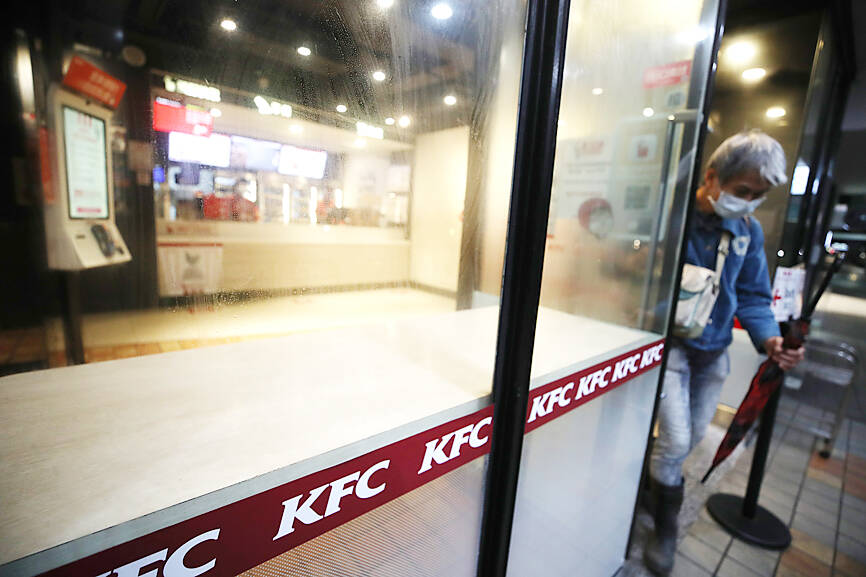US fast-food chain KFC is raising the prices of some of its items in Taiwan to reflect growing costs, the company said yesterday.
Starting today, prices would increase by an average of 6.2 percent, KFC said in a statement.
Prices increased by NT$6 for an egg tart, NT$6 for a piece of fried chicken, NT$4 to NT$7 for orders of French fries, NT$6 for a Zinger spicy chicken sandwich and NT$11 for a Peanut Lava Zinger, it said.

Photo: CNA
As for beverages, the price of a small hot Americano rose by NT$1 and the prices of milk tea, Coca-Cola and lemon iced tea increased by NT$3 to NT$5, it added.
KFC attributed the price hike to rising operating costs and issues affecting the global chicken supply chain.
It came after several other brands, including McDonald’s, Din Tai Fung (鼎泰豐) and Dain-Dain Hamburger (丹丹漢堡), announced plans to raise prices.
Meanwhile, convenience store chain Taiwan FamilyMart Co (全家便利商店) is to increase the price of tea eggs from NT$10 to NT$13 from Wednesday next week.
The price hike, the first for cooked eggs since 2015, reflects the continuously rising price of eggs, which has climbed nearly 40 percent over the past six months, FamilyMart said on Monday.
Tea eggs, which are eggs cooked in tea and soy sauce, are a popular and unique staple item at convenience stores across the nation.
A special promotion is to be held from Wednesday to Feb. 7, during which customers who pay an additional NT$1 for designated drinks would receive a free tea egg, or they can buy 10 tea eggs for NT$100 by using the FamilyMart app, it said.

Taiwan Semiconductor Manufacturing Co (TSMC, 台積電) founder Morris Chang (張忠謀) yesterday said that Intel Corp would find itself in the same predicament as it did four years ago if its board does not come up with a core business strategy. Chang made the remarks in response to reporters’ questions about the ailing US chipmaker, once an archrival of TSMC, during a news conference in Taipei for the launch of the second volume of his autobiography. Intel unexpectedly announced the immediate retirement of former chief executive officer Pat Gelsinger last week, ending his nearly four-year tenure and ending his attempts to revive the

WORLD DOMINATION: TSMC’s lead over second-placed Samsung has grown as the latter faces increased Chinese competition and the end of clients’ product life cycles Taiwan Semiconductor Manufacturing Co (TSMC, 台積電) retained the No. 1 title in the global pure-play wafer foundry business in the third quarter of this year, seeing its market share growing to 64.9 percent to leave South Korea’s Samsung Electronics Co, the No. 2 supplier, further behind, Taipei-based TrendForce Corp (集邦科技) said in a report. TSMC posted US$23.53 billion in sales in the July-September period, up 13.0 percent from a quarter earlier, which boosted its market share to 64.9 percent, up from 62.3 percent in the second quarter, the report issued on Monday last week showed. TSMC benefited from the debut of flagship

A former ASML Holding NV employee is facing a lawsuit in the Netherlands over suspected theft of trade secrets, Dutch public broadcaster NOS said, in the latest breach of the maker of advanced chip-manufacturing equipment. The 43-year-old Russian engineer, who is suspected of stealing documents such as microchip manuals from ASML, is expected to appear at a court in Rotterdam today, NOS reported on Friday. He is accused of multiple violations of the sanctions legislation and has been given a 20-year entry ban by the Dutch government, the report said. The Dutch company makes machines needed to produce high-end chips that power

Taiwan would remain in the same international network for carrying out cross-border payments and would not be marginalized on the world stage, despite jostling among international powers, central bank Governor Yang Chin-long (楊金龍) said yesterday. Yang made the remarks during a speech at an annual event organized by Financial Information Service Co (財金資訊), which oversees Taiwan’s banking, payment and settlement systems. “The US dollar will remain the world’s major cross-border payment tool, given its high liquidity, legality and safe-haven status,” Yang said. Russia is pushing for a new cross-border payment system and highlighted the issue during a BRICS summit in October. The existing system